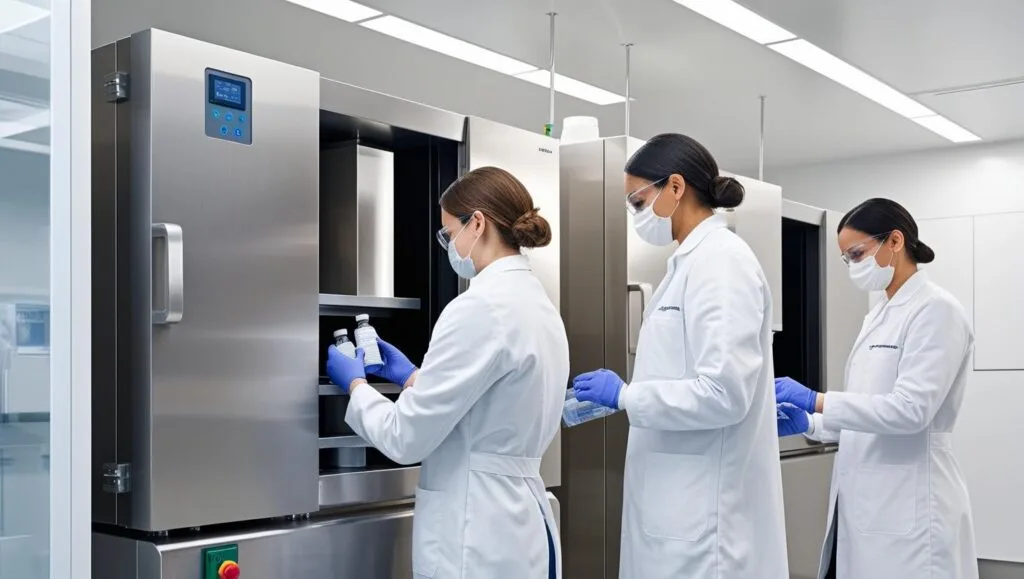Freeze dryers or lyophilizers, are a vital process in laboratories, pharmaceutical production, biotechnology, and food processing. This technique preserves the structure, stability, and composition of your samples by removing moisture. Choosing the right freeze dryer ensures sample integrity, process efficiency, and meets your application-specific requirements.
In this article, we will discuss freeze dryers and its principles, key technical specifications, and essential factors to consider when selecting a freeze dryer. We’ll also explore the differences between freeze-drying methods, condenser temperature choices, and tips for optimizing your laboratory workflow. If you’re in South Africa, Apex Scientific offers an excellent range of freeze dryers tailored to your needs.
General Principles of Freeze Drying
Freeze drying follows a three-stage process:
- Freezing: The sample is frozen to convert water into ice. The method used for freezing influences ice crystal size and drying efficiency.
- Primary Drying (Sublimation): In a vacuum, ice changes directly to vapor, bypassing the liquid phase. This energy-intensive stage is crucial to drying.
- Secondary Drying (Desorption): This phase removes any residual moisture at a slightly elevated temperature, stabilizing the product for long-term storage.
Understanding these steps is essential for optimizing your freeze-drying process. When you purchase freeze dryers from Apex Scientific, we can guide you through the ideal process settings for your specific applications.
Primary vs. Secondary Drying: Understanding the Difference
- Primary Drying: This phase occurs under vacuum and low temperatures, with ice sublimating directly to vapor. Maintaining precise pressure and temperature control prevents sample collapse.
- Secondary Drying: After primary drying, residual moisture is removed at higher temperatures. This stage ensures sample stability for future use.
The efficiency of these drying stages is crucial for maintaining the quality of your samples. By selecting the right freeze dryer from Apex Scientific, you can ensure optimal conditions for each phase.
Types of Laboratory Freeze Dryers
Different types of freeze dryers serve various applications. Here are the main types:
A. Manifold-Type Freeze Dryers
- Best for small-scale, multiple-sample applications.
- Samples are placed in individual flasks connected to a vacuum manifold.
- Ideal for research labs and biological samples.
B. Shelf Freeze Dryers
- These systems feature temperature-controlled shelves for consistent drying conditions.
- Shelf freeze dryers are well-suited for pharmaceuticals, food processing, and high-throughput applications. They offer greater automation and reproducibility compared to manifold systems.
Choosing the right type of freeze dryer depends on your sample type, batch size, and process control needs. Apex Scientific offers freeze dryers from Zirbus, one of the leading suppliers in this field, offering both manifold and shelf freeze dryers. Explore Zirbus Freeze Dryers here. Additional, Apex Scientific offers an economic range from Antech Scientific for basic research and commercial applications.
Importance of Choosing the Correct Condenser Temperature
The condenser temperature plays a pivotal role in efficient freeze drying. For optimal performance, the condenser temperature should be at least 10–15°C lower than the sample’s freezing point.
Typical condenser temperature ranges:
- -50°C to -60°C: Best for aqueous samples.
- -80°C and below: Required for solvents with low freezing points, such as ethanol and acetonitrile.
Optimizing Workflow for Freeze Drying
To improve freeze-drying efficiency and ensure reproducible results, consider these best practices:
- Pre-freezing Methods: Use controlled-rate freezers to create uniform ice crystals.
- Sample Thickness: Thinner samples dry faster, so keep sample depth minimal.
- Vacuum Control: Ensure the vacuum pressure remains optimal to prevent sample collapse.
- Shelf Temperature Control: Gradual temperature increases help prevent structural damage to sensitive samples.
- End-Point Determination: Pressure rise tests or moisture analyzers can confirm drying completion.
By optimizing your workflow, you’ll reduce processing time and enhance product quality. Learn more about our workflow solutions and freeze dryers by visiting Apex Scientific’s product page here.
Selecting the Right Freeze Dryer for Your Needs
When choosing a freeze dryer, consider these factors:
| Factor | Manifold-Type Freeze Dryer | Shelf Freeze Dryer |
| Sample Type | Small liquid samples | Bulk samples, pharmaceuticals |
| Batch Size | Small batch, single-use | Large batch, scalable production |
| Process Control | Limited control | Full automation, precise control |
| Cost | Lower initial investment | Higher cost, greater efficiency |
Selecting the right freeze dryer depends on the specifics of your laboratory requirements. Apex Scientific can help you choose the best model for your needs.
Overview of Freeze Dryers from Our Suppliers
Apex Scientific proudly offers high-quality freeze dryers from Zirbus, a leading manufacturer in laboratory and industrial applications:
- Laboratory Freeze Dryer: By Zirbus and Antech Scientific. Perfect for research labs with small batch requirements.
- Pilot & Technical Units: By Zirbus. Scalable solutions for process development.
- Food Freeze Dryers: By Zirbus and Antech Scientific. Designed specifically for food preservation applications.
Our freeze dryers come with excellent technical support to ensure smooth operation. Check out our range of freeze dryers on the Apex Scientific product page.
Conclusion
Freeze drying is a valuable technique for preserving biological materials, pharmaceuticals, and food products. Choosing the right freeze dryer is essential for ensuring sample integrity and optimizing your workflow. By understanding the different types of freeze dryers, the importance of condenser temperature, and best practices for workflow optimization, you can make an informed decision.
At Apex Scientific, we provide premium freeze dryers and expert advice tailored to your needs in South Africa. Contact us today to explore our range of Zirbus freeze dryers and find the perfect solution for your laboratory. Visit our website for more information.




